

Differentiation: It is now time to think again. In January 2016, I wrote a blog post about differentiation.
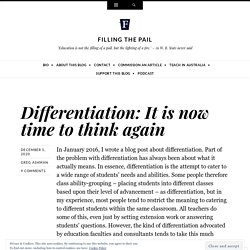
Part of the problem with differentiation has always been about what it actually means. In essence, differentiation is the attempt to cater to a wide range of students’ needs and abilities. Some people therefore class ability-grouping – placing students into different classes based upon their level of advancement – as differentiation, but in my experience, most people tend to restrict the meaning to catering to different students within the same classroom. All teachers do some of this, even just by setting extension work or answering students’ questions. However, the kind of differentiation advocated by education faculties and consultants tends to take this much further. In the 2016 blog post, I referred to a graph I had generated in 2014 from PISA data showing that, if anything, greater levels of differentiation were associated with worse mathematics results and, referencing a piece of research from the U.S., I concluded that:
Resurser för kvalitetsutveckling. How the EEF gets metacognition and self-regulation wrong – and why it matters – Rethinking Education. This is an extract from our forthcoming book Fear is the Mind Killer: Why Learning to Learn deserves lesson time – and how to make it work for your pupils.
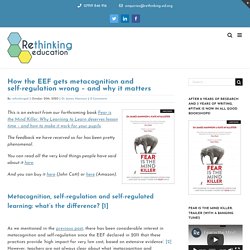
The feedback we have received so far has been pretty phenomenal. You can read all the very kind things people have said about it here. The Soak. Not spoon-feeding: Teaching essay writing and helping students to plan their work is a decolonising practice. 100 Faces of Further Education : Skills and Education Group. Further education plays a vital role in creating a more just and equal society.

However, it cannot fix inequality alone. With the COVID-19 pandemic likely to entrench inequality even further, there is a need to understand how we create a more equal society through further education and skills. That’s why the Skills and Education Group is today launching the 100 Faces of Further Education. This project aims to provide insights into the barriers and successes of achieving social justice by telling the stories of students and staff from across our membership. A collection of retrieval practice research and resources … As the author of a book solely dedicated to retrieval practice I often get asked questions by teachers, students and parents about this teaching and learning strategy.
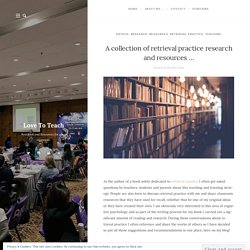
People are also keen to discuss retrieval practice with me and share classroom resources that they have used for recall, whether that be one of my original ideas or they have created their own. I am obviously very interested in this area of cognitive psychology and as part of the writing process for my book I carried out a significant amount of reading and research. During these conversations about retrieval practice I often reference and share the works of others so I have decided to put all those suggestions and recommendations in one place, here on my blog! I’ve included links to academic research, websites, blogs, classroom resources, videos, podcasts and online courses all linked to developing further knowledge, understanding, and implementation of retrieval practice.
Technology-supported management education: a systematic review of antecedents of learning effectiveness. I think this article is worth a look even though I have a number of issues with it.
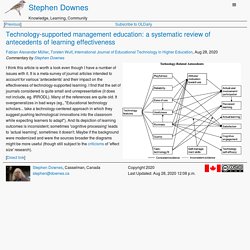
It is a meta-survey of journal articles intended to account for various 'antecedents' and their impact on the effectiveness of technology-supported learning. I find that the set of journals considered is quite small and unrepresentative (it does not include, eg. IRRODL). Many of the references are quite old. Why Project Based Learning prepares students for the modern world. The business of creativity If you’re new to education and haven’t discovered the most watched TED talk of all time ‘Do schools kill creativity?’
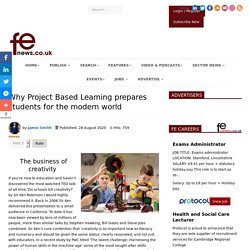
By Sir Ken Robinson I would highly recommend it. Back in 2006 Sir Ken delivered this presentation to a small audience in California. 6 ideas for taking a curriculum deep dive – with free resources! 1 | How to…make sure your curriculum foundations are solid Curriculum is the undisputed buzzword of 2019, and the current focus on it presents enormous opportunity, but also risks, so it’s essential to make sure the foundations are sound.

But how very exciting that we can take some time to think really deeply about what we teach our pupils, when, and in how much detail. So let’s all stop and take a deep breath. We need to be really careful to get this right, because unlike other trendy initiatives to sweep through education, curriculum is the very backbone of a school. It is not something that can be fixed and set out in a single SLT meeting, or during the morning of an INSET day. Find out how it can be done here. 2 | How to…get the best out of knowledge organisers Next up, it’s time to explore a tool gaining huge popularity in classrooms up and down the country, knowledge organisers.
Let’s start with the ‘why’ – the exact purposes of a knowledge organiser, which are threefold. Rethinking assessment practices. COVID-19’s effect on assessment practices.
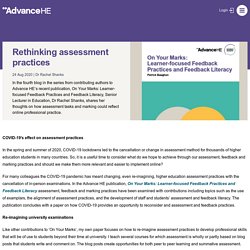
7 ways educational technology improves classroom experiences. Article by Radix contributor Nadav Avni.
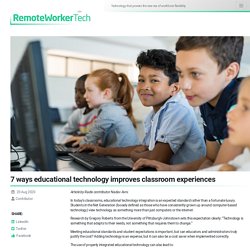
In today’s classrooms, educational technology integration is an expected standard rather than a fortunate luxury. Students in the Net Generation (loosely defined as those who have consistently grown up around computer-based technology) view technology as something more than just computers or the internet. Research by Gregory Roberts from the University of Pittsburgh-Johnstown sets this expectation clearly: “Technology is something that adapts to their needs, not something that requires them to change.” Meeting educational standards and student expectations is important, but can educators and administrators truly justify the cost? Yorkshire and Humber Practice Development Groups.
Moodle. I’ve always marvelled at the dexterity and skill of those able to weave hair into elaborate braids (French, Dutch, Fishtail) – how they can keep the structure of the braid in tact whilst weaving in new strands.
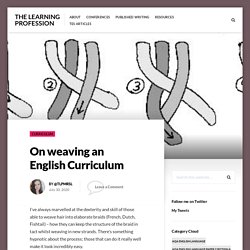
There’s something hypnotic about the process; those that can do it really well make it look incredibly easy. Teaching and learning a subject discipline is an act of weaving. We want students to pick up a strand and then pick up another and another. We want them to keep hold of each strand and weave it around the others to make something strong and long-lasting because those strands that don’t get pulled into the braid get lost and break away. Vision — The College of the Future. The college of the future will be central to driving a fairer, more sustainable and more prosperous society. For people, colleges will be a touchpoint for everyone throughout their lives as the world changes.
Flexible and blended learning and guidance will empower each person to get a job, progress in their career and be an active citizen. Desiring Difficulties. It seems to be human nature to look for the path of least resistance. In most facets of our life we look for the next ‘thing’ that will make it easier. What can I buy that will make for less work? Will this gadget quicken this chore? Now, most of the time, these innovations enhance our life. I am very thankful for Alva J. The Essentials of Numeracy. The Essentials of Numeracy are the skills and attitudes that everyone needs to use numbers and data to make good decisions at work and at home. National Numeracy has worked with employers, unions, charities and maths experts such as Cambridge Maths, to define the Essentials of Numeracy: the core mathematical skills that we all need to be confident and competent with numbers in daily life and the workplace.
The Essentials includes things like being able to understand percentages, spot best-buy deals in the supermarket and manage your money. So we’re not talking about algebra and trigonometry. The National Numeracy Challenge website allows anyone to find out whether they have a good grasp of the Essentials of Numeracy: • If they do, then they can get a certificate or digital badge as evidence • If they haven’t yet, then there are resources to enable them to work towards getting the Essentials National Numeracy originally created the Essentials of Numeracy in 2013. Online education in further education and skills: learning about what works - Ofsted blog: schools, early years, further education and skills. Paul Joyce, Deputy Director for Further Education and Skills, talks about our review into online education during coronavirus (COVID-19) in the further education and skills (FES) sector.
To combat the COVID-19 pandemic, social-distancing measures were implemented in late March. For the FES sector, this meant that colleges and other providers closed their doors to all but the most vulnerable learners and children of key workers. Education and learning continued remotely, in part through a range of online and other distance-learning resources, including webinars and tele-conferencing. In light of this, we wanted to understand how FES providers and their learners were getting on with remote and online education. The FES sector was also keen for us to look at this in more detail. This blog sets out our main findings. What we did Our inspectors carried out a range of activities for the review throughout June. Maybe this will be the government that delivers for further education. Gavin Williamson’s speech last Thursday on further education confirmed what he said in Parliament shortly before Covid shut everything down.
It is also what government advisors and officials have been saying for six months. His priority as Education Secretary is further education. The plan will involve a white paper. That it’s part of a bigger picture of levelling up opportunities for forgotten people and left behind places. Are the Dutch Solving the Covid Slide with Tutoring? For a small country, the Netherlands has produced a remarkable number of inventions. Large-Scale Tutoring in England: Countering Effects of School Closures. Teaching the new Theory of Knowledge curriculum from September 2020.
EEF Blog: Assessing learning in the new academic year (Part 1 of 2) – three key questions for school leaders to consider. Home. Twitter. Exploring task design as an enabler of leading teaching in secondary schools. This report, on one of the three research projects to receive the British Curriculum Forum’s Curriculum Investigation Grant for 2018–2019, investigates whether task design, as an element of curriculum theory, can be of practical, sustainable use as a tool for leaders, and as a means of generating tools that teachers can use in leading and teaching the school curriculum.
Twitter. Teachers supporting teachers Podcast — Explore & CREATE Co. Burden of Proof: Is evidence really the key to good policy design? Evidence-based policy was one of the mantras of the Blair and Brown years and remains a cherished aspiration of policymaking in the UK. It is accepted, usually without much question, as an obviously good thing at which policy in education should aim.
However, as Stephen Exley demonstrates in this excellent ‘provocation’, originally published as an article in Tes, things are not as straightforward as this suggests. Is it realistic, or even desirable, to make evidence the main driver of policy, he asks. This is an essential but rarely asked question, which is why the Further Education Trust for Leadership (FETL) decided to republish Stephen’s article.
Great Teaching Toolkit. Latest Tweets / Twitter. Goodbye Growth Mindset, Hello Efficacy and Attribution Theory. Mirjam Neelen & Paul A. Rosenblatt’s Principles of Instruction – Peer Reviewed Education Blog. Ranking Multiple-Choice Answers to Increase Cognition. EduTwitter in September 2019. Pedagogy: The death of the staffroom? Bad news for teachers. 'Schools will dump it': expert raises doubts over 'growth mindset' phenomenon.
It's not the concept that's the problem, he says; it's the execution. "It absolutely works. Podcast 56 - Unlocking the Benefits of Retrieval Practice. Making Room for Asset Pedagogies - Long View on Education. From experience to meaning… – Pedro de Bruyckere. Tackling Misconceptions Through Conceptual Change – Part 2. Threshold Concepts for Teachers. Checklist: first lesson with a new class. Cognitive Load Theory and its application in the classroom. Cognitive load theory: Teaching strategies. Eni Aluko: ‘We all have moments in life when our morals are called into question’ Making Learning Simpler, not Easier. Invisible educators or connecting professionals? Post-compulsory teacher educators. Neurodiversity is Not 'Fashion'. A Rebuttal. Five Things I Wish I knew When I started Teaching.
Decolonisethecurriculum.com. Decolonisethecurriculum.com. Unleashing knowledge (from the shackles of formal assessment). – CREducATE. 'A belt-and-braces approach to English can inspire GCSE resit success' Autism: Some Vital Research Links. A policy for feedback, not marking. Teaching and Learning Agenda 2019/20. Writing and cognitive load theory. The birth of T Levels – how are providers preparing for delivery? - NFER. Teaching methods still matter. Three things that make a teacher an expert. Go: EduTwitter in June 2019.
People remember 10%, 20%…Oh Really? Editorial: Reimagining a curriculum for teacher knowledge. Teaching-Maths – Teaching Mathematics with Passion. Stuart Kime shares study findings on not marking schoolwork. Easy Application of Spaced Practice in the Classroom. Hirsch’s ‘Why knowledge matters’ (incredibly short synopsis) 15 Cognitive Biases Which Influence The Way You Think. The Emotional Literacy Support Assistant (ELSA) Programme: Can you develop an evidence base for an adaptive intervention? ‘Elitism’? Be careful how you use that word. Engelmann’s ‘Teaching Needy Kids in Our Backward System’ (another synopsis) Direct Instruction Miracle? The Lewis Lemon Case. No Dewey-eyed dreamers here. Transition into adulthood: moving from school to college. Decolonise The Curriculum with The TeacheristLeadership, Mental Health, Wellbeing and Decolonisation of the Curriculum Consultancy by Pran Patel 0203 0053212Equity Reading list.
Teaching myths: three common errors. Blog – Bedford College Group Research Network. The implications of schemas. Who to follow on “edutwitter“ 2019/2020. EduTwitter - Educator Directory for Teachers to Encourage Networking & Better Teaching. Quick talk about texts – James Durran. What knowledge should we teach the next generation? the most important question in education. Who I am, What I do. – Christopher Waugh. The Swiss Cheese Summary.
Maximizing the Effectiveness of Multiple-Choice Qs.